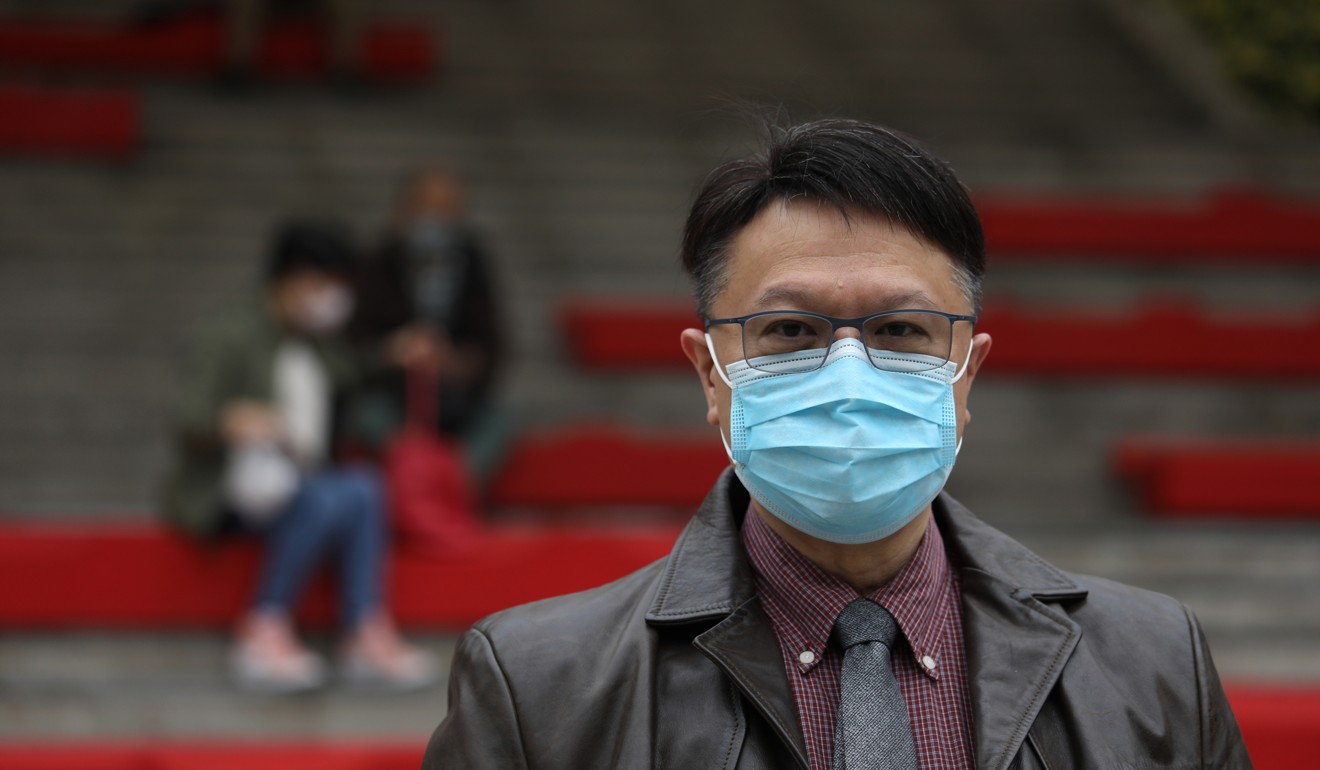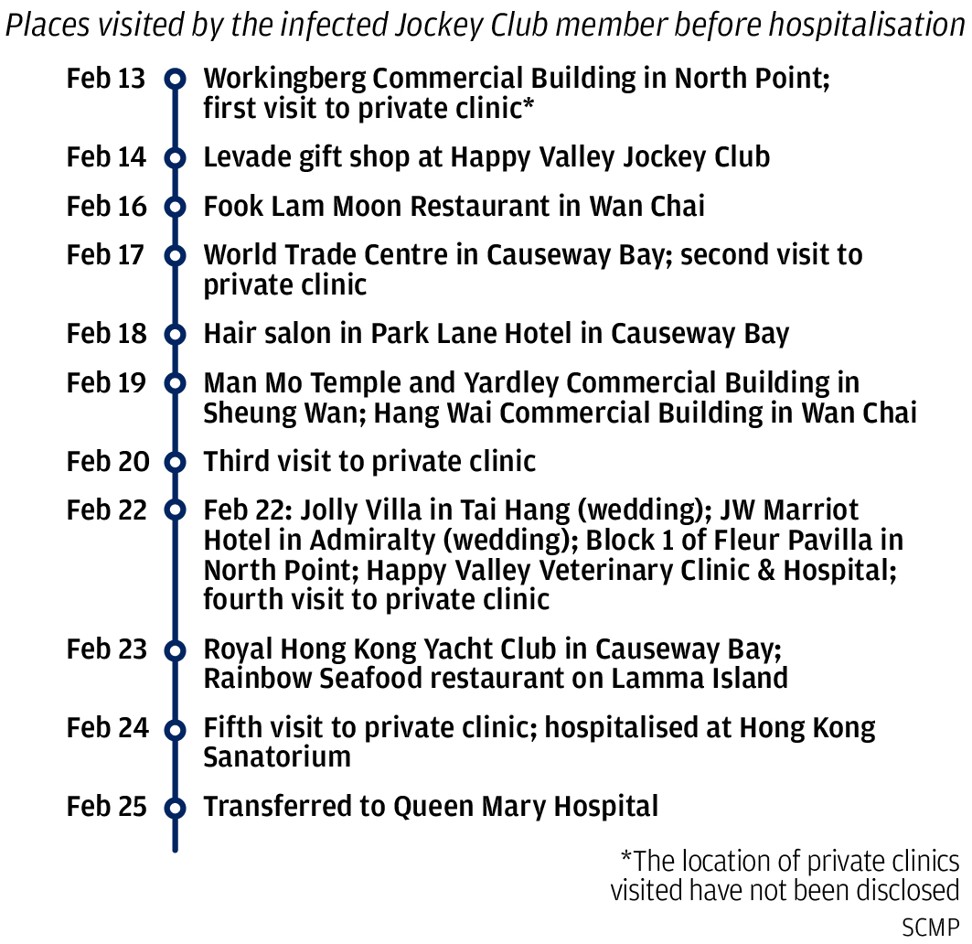Coronavirus: quarantine recommended for pets of Hongkongers with Covid-19 as Pomeranian tests positive a second time
- But city’s veterinary surgeons say ‘no evidence yet’ coronavirus could infect domesticated animals, as there is a high possibility of environmental contamination
- Oral and nasal samples taken from pet dog tested ‘weak positive’ on Friday, the same result as obtained the previous day

Hong Kong’s Department of Health is strongly recommending that dogs, cats and other mammals of confirmed Covid-19 patients undergo a 14-day quarantine after a pet Pomeranian of one patient again registered a “weak positive” for the virus that causes the disease in a second test.
Previously, family members were allowed to care for the pets of the infected if they did not live with the patients and were not subject to quarantine themselves.
“But from now on, we will ask the owners to send their pets to the [Agriculture, Fisheries and Conservation Department] for quarantine just to make sure they are not infected,” said Dr Chuang Shuk-kwan, head of the communicable disease branch of the Centre for Health Protection.
The Department of Health later clarified this was not a mandatory requirement, but was unable to say what would be done if a patient refused to surrender their pet, as they had not confronted such a situation yet.
The move came as the department revealed late on Friday that oral and nasal samples taken from the pet dog tested “weak positive” earlier in the day, the same result as obtained in a test on Thursday. The department said it would continue to do tests on the dog, which would not be returned until the results were negative.
Chuang said a cat belonging to Hong Kong’s 18th confirmed patient, a 25-year-old man, had previously been sent to the department for testing. Its results were negative, and the cat, an Exotic Shorthair, was sent back to its owner, who was discharged from hospital on February 12.
A Shiba Inu dog belonging to a 68-year-old woman with the virus, meanwhile, tested negative and was still being quarantined. The woman, the city’s 77th case, was one of those who tested positive after visiting a Buddhist temple in North Point.
Chuang said the health authorities would review the entire list of 94 patients to see if any had pets that would need to undergo testing. On the Pomeranian, the department said in a statement in the small hours of Friday that the dog, despite the initial test result, had not shown any symptoms nor was there was any evidence to suggest pets could either contract the coronavirus or be a source of infection.
At a morning press conference, Secretary for Food and Health Sophia Chan Siu-chee confirmed that the dog would undergo a 14-day quarantine at a department animal-keeping facility near the Hong Kong-Zhuhai-Macau Bridge.
The department had conducted the second test to confirm if the dog was really infected with the coronavirus, or if the result could be attributed to environmental contamination of its mouth and nose.
According to Chuang, the dog had had relatively little contact with the outside world.
“As far as we know, the dog that tested weak positive is quite old and rarely goes out. Its close contacts are only the people that it lives with, who have both already been sent to quarantine,” Chuang said.
Earlier in the day, Hong Kong veterinary surgeons called for calm after the “weak positive” case was announced.
Dr Michael Bradley from Stanley Veterinary Centre said he thought it very unlikely that pets such as dogs and cats could be infected with the coronavirus, as very few viruses can jump between species.
“There is no need to panic. There is no evidence yet that the virus can infect dogs, cats or other domestic animals,” he said. “It’s possible that the dog had the virus due to environmental contamination. A dog can be an object that carries the virus the same way as anything else, like a tissue.”

He suggested that owners observe basic hygiene after touching pets, especially hand washing, and avoid busy areas when walking their dogs.
The dog that tested weak positive is believed to belong to a Jockey Club member infected with Covid-19 whose domestic helper is also infected. The pair are among the 94 confirmed cases in Hong Kong.
“The dog tested weak positive from the nasal and mouth swab, not from a blood test. It’s quite possible that it is from the dog contacting the owner or being in the same environment with the owner,” Dr David Gething of Creature Comforts said.
Professor David Hui Shu-cheong, a respiratory medicine expert from Chinese University, also said that despite the pet’s weak positive result, it did not mean it had been infected.
It was possible that droplets from the infected pet owner had contaminated the environment or the dog, Hui said on a Friday morning radio programme.
He added that no evidence thus far shows that dogs can be infected with severe acute respiratory syndrome (Sars), Middle East respiratory syndrome (Mers) or Covid-19.
A spokesman from the Happy Valley Veterinary Clinic & Hospital said the patient visited the clinic on her own without her dog on February 22 to pick up medication. She was wearing a mask and stayed for about three minutes.
The clinic was notified about her test result on February 26, a day after she was diagnosed. They immediately sanitised the interior and sent home three receptionists who had come into contact with her for quarantine.
The three receptionists did not qualify for the government’s isolation scheme as their contact with the patient was brief.
It would be unlikely other visitors and pets would be affected due to the patient’s short stay and the absence of her dog, the spokesman said.

A spokesman from Hong Kong Jockey Club, meanwhile, said the infected member had not visited her horse’s stable within 14 days before she was confirmed to have the infection nor did she attend her horse’s most recent race on February 5.
“According to the professional expertise of the club’s veterinary surgeons, there is no evidence that Covid-19 causes disease in horses or replicates in horses,” he said. “Nor is there any evidence to suggest that there is transmission from horses to humans.”
That Jockey Club’s take echoed a February 14 joint statement by the Society for the Prevention of Cruelty to Animals (Hong Kong) and the Hong Kong Veterinary Association (HKVA) said they had yet to find evidence that dogs and cats could be infected by the coronavirus.
Dr Florence Chan, secretary of the HKVA’s executive committee, said although what happened to the dog might appear to be a new development, it would be wrong to jump to conclusions.
“According to what we have on hand, the dog actually did not display any symptoms,” she said.
She advised pet owners to wash their hands after coming into contact with their pets and avoid taking their animals to dirty places.
They should also wash their pets’ paws with soap after taking them outside, she added. For those who find that insufficient, she recommended that owners put “shoes” on their pets’ paws that could be removed and sanitised separately.
Professional veterinary surgeons will actively monitor and take test samples from the dog, and release it only when the results come back negative for the coronavirus.
“The AFCD does not at this point in time have sufficient evidence showing pets will contract or spread Covid-19,” the health minister said. But she warned pet owners to observe good personal hygiene practices and maintain appropriate social distancing to prevent the spread of the virus.
In a statement, the AFCD said that infected patients were strongly advised to put their mammalian pets under quarantine to ensure public and animal health.
Although there were some suggesting pets be brought to private clinics, I think it’s better to contact the government … private clinics probably aren’t equipped to diagnose the virus
According to the Department of Health’s quarantine requirements, if pet owners are confirmed with Covid-19 infections, their pets are to be delivered to AFCD’s animal-keeping facility under the supervision of the Veterinary Office for two weeks for quarantine, veterinary monitoring and virus test.
“Although there were some suggesting pets be brought to private clinics, I think it’s better to contact the government, because they are handling quarantine, and private clinics probably aren’t equipped to diagnose the virus,” Gething said.
The World Health Organisation said there was no evidence that companion animals or pets such as dogs or cats could be infected with the novel coronavirus.
“However, it is always a good idea to wash your hands with soap and water after contact with pets. This protects you against various common bacteria such as E coli and Salmonella that can pass between pets and humans,” the organisation said on its website.
Additional reporting by Victor Ting